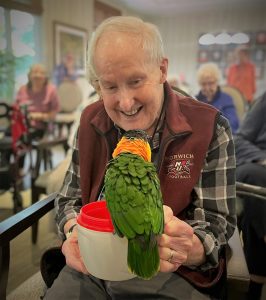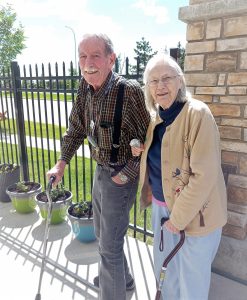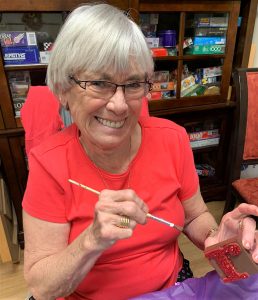
If you care for a loved one with Alzheimer’s or dementia, you may notice a behavioural shift that accompanies the lengthening shadows of late afternoon. As the sun begins to set, your loved one may act in ways that are out of character for them. This restlessness, confusion, increased insecurity, and reduced attention span is commonly referred to as sundowning or sundown syndrome.
What Causes Sundowning?
Sometimes called late-day confusion, sundowning refers to a group of symptoms that typically begin in the late afternoon, lasting into the night.
No one is sure what causes sundowning. Although it seems to result from changes occurring in the brain. Newer research suggests that it is tied to the circadian rhythm.
Sundowning Symptoms and Behaviours
It is thought that sundowning is experienced by up to 66% of people with Alzheimer’s disease or other dementias. It can occur at any stage of the disease, but it tends to peak in the middle stages of dementia and lessens as the disease progresses.
What are the early signs of sundowning?
At first, symptoms of sundowning can be subtle and easy to overlook. They may be minor and varying. One night your loved one may be a little more confused or weepy at twilight, while the next evening they may seem slightly irritable. To the keen observer a pattern will start to immerge.
Typical signs of sundown syndrome are:
- Agitation, anger, or irritability
- Confusion, delusions, or hallucinations
- High levels of anxiety
- Pacing or wandering
The behaviours associated with sundowning are more likely to occur when the individual has unmet needs that they cannot express. These might include tiredness, hunger, and pain. Another potential trigger is low light. In some cases, the onset of winter’s shorter days amplifies sundowning.
Tips For Managing Sundown Syndrome
 The key to navigating sundown syndrome is creativity, flexibility, empathy, and strong observational skills. Since no two people are exactly alike, be prepared for some trial and error. Successes may look different from day to day. But even a little bit of success can greatly ease your loved one’s anxieties, as well as your own stress.
The key to navigating sundown syndrome is creativity, flexibility, empathy, and strong observational skills. Since no two people are exactly alike, be prepared for some trial and error. Successes may look different from day to day. But even a little bit of success can greatly ease your loved one’s anxieties, as well as your own stress.
Observe and minimize
You may need to put on your detective’s cap to find the trigger for your loved one’s behaviour. Look for fatigue, loud noises, discomfort, taxing activities, or changes in environment or caregivers.
Keep in mind – transitions and activities that you consider normal can be anxiety-producing for those with dementia. For example, does the TV get switched to something intense, like the news or a loud show? Is there are a lot of cross talk during mealtimes?
Monitor diet
Watch for nutritional triggers and adjust eating and drinking schedules. Avoid giving food or drinks containing caffeine or large amounts of sugar, especially late in the day, as these can disrupt sleep. Don’t serve alcoholic beverages, which may increase confusion.
Create structure during the day
Daily routines can help your loved one feel safe by minimizing surprises and reducing confusion. Offer structured meaningful activities earlier in the day, including physical exercise and movement. Don’t forget to provide opportunities for socialization.
Being a part of a dedicated program, like ASC’s Blossom Living, helps create much needed structure and enrichment through the day.
Support proper rest
 Try to avoid challenging, stressful tasks around dusk and at night. Alternate activity with brief periods of rest and ensure your loved one gets a good night’s sleep.
Try to avoid challenging, stressful tasks around dusk and at night. Alternate activity with brief periods of rest and ensure your loved one gets a good night’s sleep.
Fatigue and lack of sleep can worsen symptoms. Reduce physical, visual, and auditory clutter in your loved one’s bedroom – think calm, comfortable, and dark.
Let in the light
Exposure to bright light in the late afternoon or early evening is associated with a reduction in sundowning episodes. As it gets dark outside, close drapes and turn on inside lights to keep the environment well-lit, minimize shadows, and improve visibility.
Play music and calming sounds
Some find that music throughout the day helps. Instrumental in the morning, sing-along favorites or show tunes during the day, and calming music in late afternoon and evening. When a diversion is needed, try singing your loved one’s favourite song and encourage them to join in!
Use healing touch
Never underestimate the value of a hand or foot massage to relax tense muscles and increase feel-good hormones. Adding lightly scented essential oils can have a calming effect.
Validate and distract
Trying to reason with someone in the midst of a sundown episode is unlikely to work. Approach the person calmly and use a peaceful tone of voice. It’s also important to validate your loved one’s experience and feelings (even if they don’t make sense to you). It lets them know that you are listening.
Draw them away from troubling thoughts and anxieties by diverting or redirecting attention to favorite activities, foods, pets, and people. Soothing music or relaxing activities are also great choices.
Self-reflect
Reflect on your own behavior. As a caregiver, you may be tired, frustrated or short-fused, which can trigger behavioral responses in the person with memory loss.
Take care of yourself
Your health is important too. Make sure you get regular exercise and eat nutritious foods. Find ways to relax and try to get the rest you need.
Seek support from family and friends or ask your doctor about respite care or support services to give yourself a necessary break. These things will give you strength to continue providing care. Read this Caregiver Stress Checklist.
Seek support
If sundowning continues to be a problem, seek medical advice. A medical exam may identify the cause of sundowning, such as pain, a sleep disorder or other illness, or a medication side effect.
Memory Care Options at All Seniors Care
 The type of care that people with dementia receive, as well as their living environment, greatly influences their sense of joy. The right type of care provides a better quality of life for the individual and reduces caregiver stress.
The type of care that people with dementia receive, as well as their living environment, greatly influences their sense of joy. The right type of care provides a better quality of life for the individual and reduces caregiver stress.
All Seniors Care offers memory care services and amenities like sensory rooms or secure terraces. To support seniors living with early cognitive decline, Blossom Living provides structure and cognitive stimulation so that residents can live independently for longer and continue to age-in-place through all stages of dementia. Trained, dedicated staff are on hand around the clock to help individuals and couples lead meaningful and fulfilling lives.
If you aren’t a resident, but are looking for a comfortable home for yourself or a loved one, take a look at our senior communities like the Summit Heights or Lakeridge Heights residences in Ontario. Schedule a visit to find out how our dementia-friendly design aims to support seniors experiencing sundown syndrome at all stages of their illness.
Reference: https://www.ncbi.nlm.nih.gov/pmc/articles/PMC5187352/
Writer – Julianna McLeod
Julianna is a health and wellness expert at All Seniors Care. Her mission is to create content that empowers seniors to form sustainable solutions for lasting health and happiness. She is an experienced writer, editor, and Recreational Therapist living in Toronto.